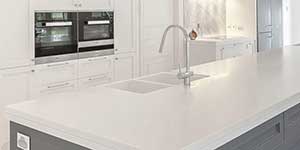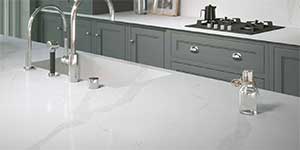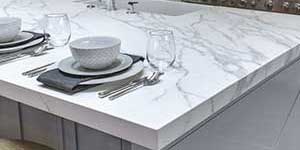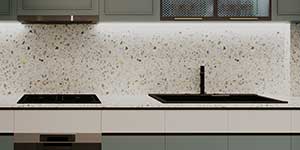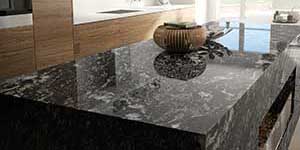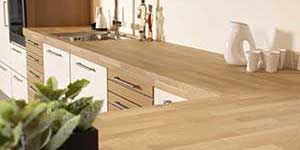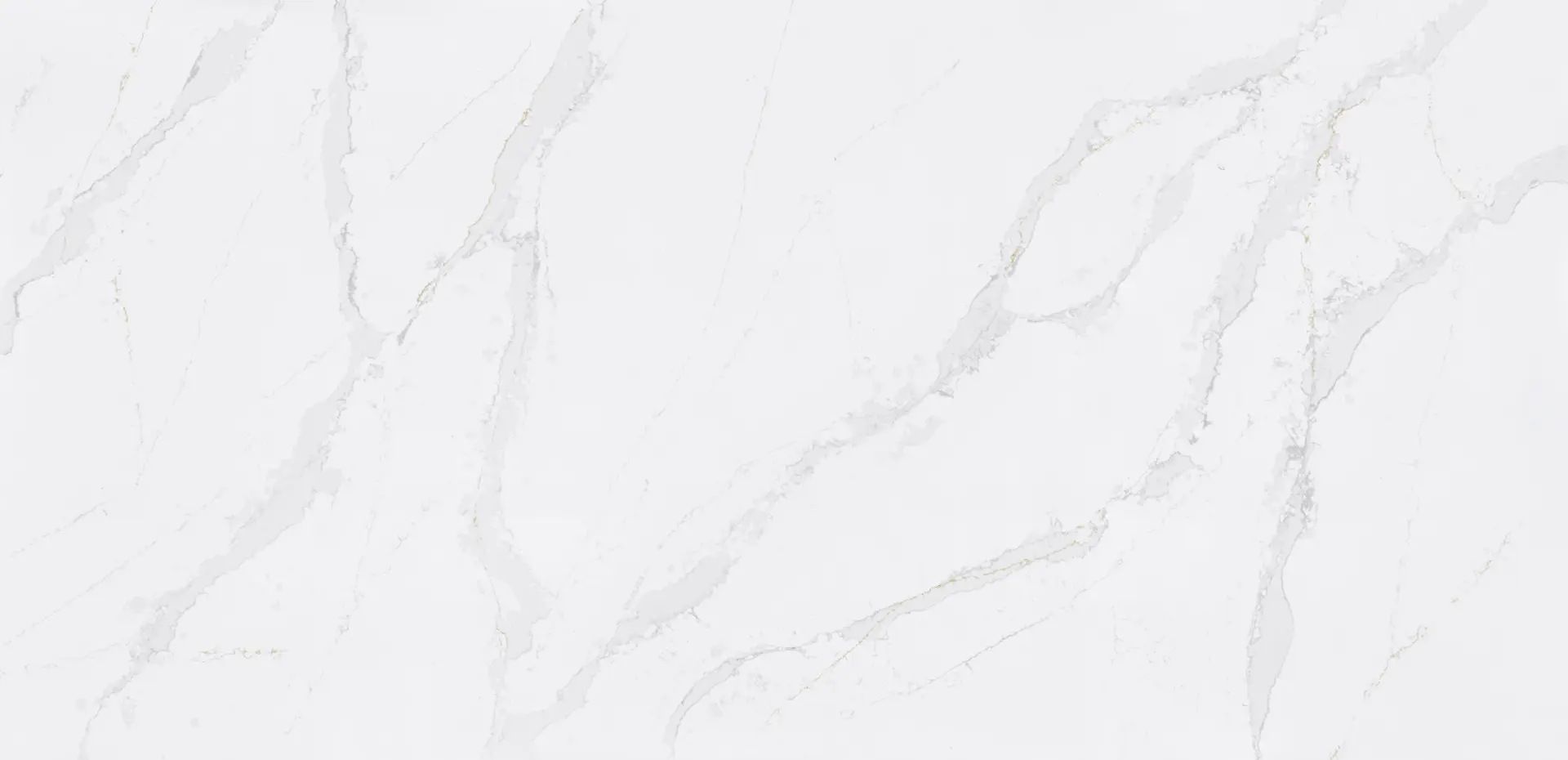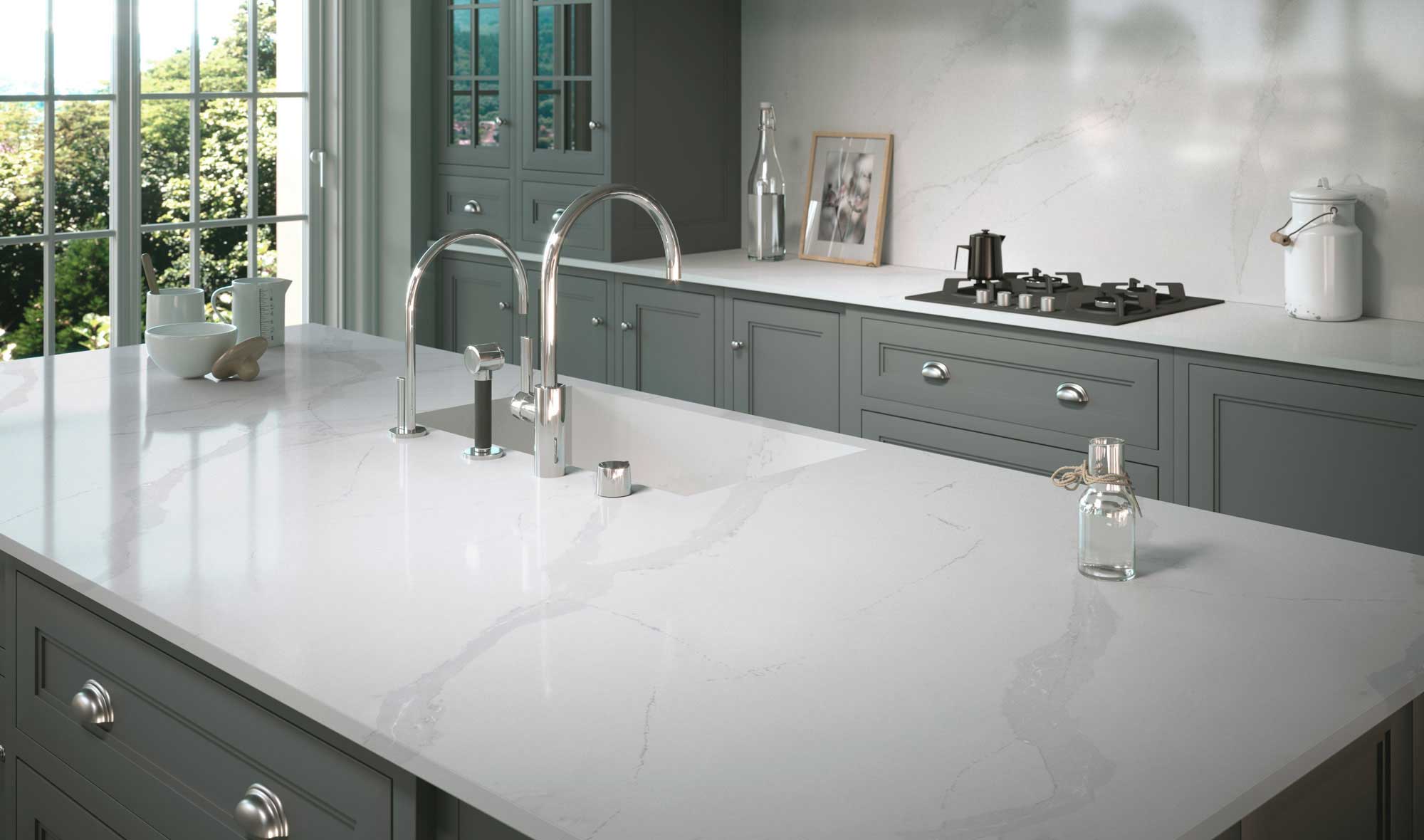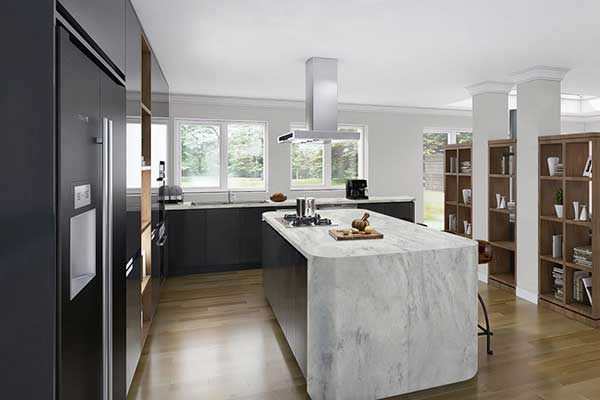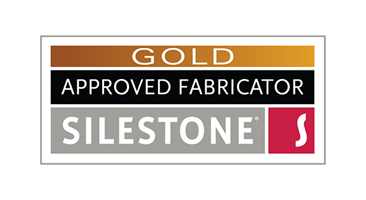Quick overview
The main difference between Silestone and granite is that granite is natural quarried stone, consisting of between 10-50% quartz, while Silestone is an engineered quartz worktop, made from 94% quartz, blended with polymer resins, eliminating the natural imperfections found in granite
Silestone will consequently cost more, but you will enjoy greater strength, resilience, hardness, durability, and hygiene.
Both Silestone and granite make exceptional kitchen worktops, that sets any kitchen apart in terms of luxury, durability, and aesthetics.
Whereas granite slabs are restricted by the size of the quarried stone, and the quality of natural granite varies greatly, Silestone kitchen worktops can be manufactured of consistent quality to any size and thickness.
Granite is grained and coloured with minerals that swirl through when the molten stone crystallises and cools down over millennia, deep in the earth’s crust. Even the best quality granite contains microscopic cracks, fissures, and pores.
Silestone is grained and coloured with chips of pigmented crystal, swirled in artificially in a matter of hours. It is created uniformly, without any cracks, fissures and pores.
Clearly, there is no simple answer as to which is best for you. To help you make an informed decision, this article will highlight the main differences and similarities between Silestone and natural granite.
A Detailed Comparison Between Silestone and Granite
What is a Silestone® worktop?
Silestone® is the Spanish company Consentino’s registered brand name for the highest quality quartz, manufactured in slabs of different thicknesses, which are suitable for kitchen and bathroom worktops, sinks, shower trays, flooring and wall cladding.
Silestone is manufactured in a special process from a compound of 94% top-quality natural quartz crystals, silica and other natural stone minerals, blended with resins and colour pigments to produce worktop surfaces that are extraordinarily strong, resilient and stain-resistant. A unique feature of Silestone is its antibacterial quality, obtained by blending anti-microbial silver ions into the resin, actively killing bacteria and viruses.
Worktops.net, the leading specialist in the UK, fabricates Silestone slabs into bespoke worktops in our state-of-the-art factory in Kendal, designed and built exclusively to fabricate kitchen and bathroom worktops.
What is Granite?
Granite is formed when magma, with a high content of quartz, alkali feldspar, and silica minerals in various proportions, slowly cools down and solidifies underground.
Types of Granite
Not all granite is the same, nor of equal quality and it is important to be aware of the differences and to buy your granite worktops from reputable suppliers.
The most common type of granite used for countertops is black granite.
Apart from quality, the other types are mainly classified by their colour, which includes Black Pearl, Baltic Brown, Tan Brown, Venetian Gold, Kashmir White, Blue, Pink, Red, and even Green Granite.
Cosentino also offers Sensa Granite, the highest quality granite with a revolutionary stain-resistant protective treatment.
Similarities between Silestone and Granite
Both Silestone and natural Granite are:
- Highly durable and will last for a lifetime if properly cared for.
- Heat-resistant enough so you can put hot pots on them straight from the stove. Granite is formed by very high heat and is therefore the most heat-resistant stone used for countertops, even more so than Silestone. However, it is still best to use a trivet to protect the worktops though because thermo-shock (sudden changes in temperature) could cause them to crack.
- Scratch-proof, but because Silestone is harder, it will resist scratches better.
- Ultra-luxurious and add a special ambience to any kitchen.
- Inherently eco-friendly, although Silestone is more sustainable as it does not require entire blocks from which slabs are cut.
- Hard materials that require professional installation and repairs and cannot easily be installed DIY. Because Silestone is much harder, it will require even more sophisticated equipment to cut and polish the surface.
Silestone could look identical to granite in some instances but would be heavier because of its greater density.
Differences between Silestone and Granite
Porosity and Hygiene
- Silestone is completely compact and non-porous, so it is ultra-hygienic and does not stain. Granite has microscopic fissures and pores where liquids can accumulate and germs can grow.
- Any type of oil is very bad for granite, so watch out for pizza boxes, peanut butter sandwiches and so on, while Silestone is impervious to oils and most chemicals.
- Granite, if sealed properly, is very hygienic, but Silestone is much more so, because it has silver ions mixed into the slab, actively fighting germs.
- Granite can handle high heat better (not sudden temperature change) but is damaged by acids more easily than Silestone.
Hardness
Silestone is harder than granite, yet is more resilient and will not crack or break as easily.
Maintenance and cleaning
- Granite needs to be sealed at the beginning and with regular intervals, while Silestone does not need to be sealed and is virtually maintenance-free.
- Granite is easy to clean, but harder to keep it looking clean because if not properly maintained, it can lose its sheen. Crumbs, dirt, and dust show up more easily against the dark background of granite. Silestone just needs a wipe with a damp cloth and light rubbing with a dry cloth to retain its lustre.
Appearance and colours
- Silestone contains a much greater amount of quartz than most types of granite, giving it a distinctive lustre.
o Silestone is available in a much larger range of colours and patterns than granite, vastly multiplying design opportunities. - Silestone is manufactured in three different textures:
- Polished/gloss finish, which intensifies the colours and gleam.
- Suede, creating a unique feel and elegance.
- Volcano, unique to Cosentino Silestone, which results in a smooth, rustic appearance.
- Colours and patterns are much more consistent throughout the worktop slab and also across different slabs, while granite might still win the beauty contest because each slab of granite is unique and a talented designer can exploit the colour and pattern variation to great advantage.
Accessories and trimmings
Silestone has a much wider range of accessories such as backsplashes, wall cladding, integrated and colour-coordinated basins and sinks, and maximises harmony with either Silestone or other natural materials used on the floor, walls, and on cabinets.
Natural or man-made?
Granite is a natural stone formed over thousands of years, whereas Silestone is an engineered stone, emulating the metamorphosis in a matter of hours.
UV resistance
Granite is more UV resistant than Silestone and thus the colours will not fade when used outdoors or in direct sunlight.
Cost
Silestone is usually more expensive than granite.
Which is Better? Silestone or Granite? The Verdict
Function
Silestone is considered superior in terms of functionality, consistency and range of colours, slab sizes, and design possibilities. If fabricated by Worktops.net and installed by one of our approved installers, our Silestone worktops carry an unprecedented 25 year warranty.
If you prefer the superior physical qualities and a large variety of design possibilities, you will probably choose Silestone, except for outdoor use where the countertops are exposed to harsh sunlight and especially the darker colours might fade.
Beauty
It is probably a case of beauty being in the “eye of the beholder.” While Silestone is just as smooth and mimics the beauty of natural stone, purists will insist the imperfections of granite actually enhances its appeal and it boils down to personal preference.
If your choice tends towards creative colour and pattern variation, and a more “natural” feel, and you don’t mind the extra work, then granite is for you.
Talk to us today 0330 088 3391 if you want to discuss worktops that are right for your needs.
Other inspiring articles
Why Silestone Eternal Calacatta Gold is one of the UK’s best selling worktop colours
In the world of interior design, the kitchen is more than just a functional space; it's the heart of the home, a place where style meets practicality. One of the standout stars in kitchen [...]
A Solid Choice: Why Solid Surface Worktops are a Top Pick for your Kitchen
Solid surface worktops, such as Corian, Hanex, and Hi-macs, have been steadily gaining popularity in the world of kitchen design and renovation. While there's a plethora of worktop materials to choose from, solid surface [...]
Choosing the Perfect Kitchen Worktop
A comprehensive guide to Quartz, Solid Surface, Ultra Compact, Granite, and Wood When it comes to designing your dream kitchen, one of the most crucial decisions you'll make is selecting the perfect [...]
How to restore Corian countertops
Corian countertops are a popular choice for many homeowners due to their durability and low maintenance requirements. But if yours has become stained or damaged, you’ll need to know how to restore [...]

